-
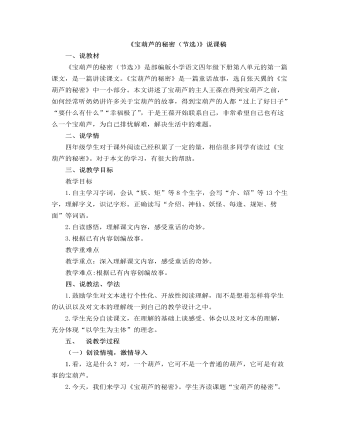
部编人教版四年级下册《 宝葫芦的秘密(节选)》说课稿
三、说教学目标教学目标1.自主学习字词,会认“妖、矩”等8个生字,会写“介、绍”等13个生字,理解字义,识记字形。正确读写“介绍、神仙、妖怪、每逢、规矩、劈面”等词语。2.自读感悟,理解课文内容,感受童话的奇妙。3.根据已有内容创编故事。教学重难点教学重点:深入理解课文内容,感受童话的奇妙。教学难点:根据已有内容创编故事。四、说教法、学法1.鼓励学生对文本进行个性化、开放性阅读理解,而不是想着怎样将学生的认识以及对文本的理解统一到自己的教学设计之中。2.学生充分自读课文,在理解的基础上谈感受、体会以及对文本的理解,充分体现“以学生为主体”的理念。
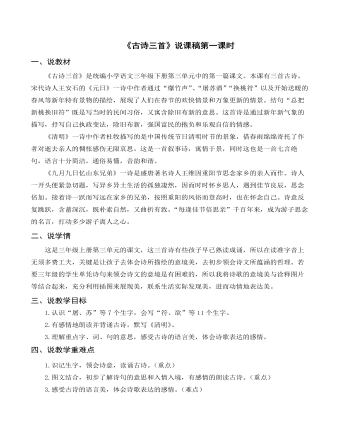
(说课稿)部编人教版三年级下册《古诗三首》第一课时
一、说教材《古诗三首》是统编小学语文三年级下册第三单元中的第一篇课文。本课有三首古诗。宋代诗人王安石的《元日》一诗中作者通过“爆竹声”、“屠苏酒”“换桃符”以及开始送暖的春风等新年特有景物的描绘,展现了人们在春节的欢快情景和万象更新的情景。结句“总把新桃换旧符”既是写当时的民间习俗,又寓含除旧布新的意思。这首诗是通过新年新气象的描写,抒写自己执政变法,除旧布新,强国富民的抱负和乐观自信的情感。《清明》一诗中作者杜牧描写的是中国传统节日清明时节的景象,借春雨绵绵寄托了作者对逝去亲人的惆怅感伤无限哀思。这是一首叙事诗,寓情于景,同时这也是一首七言绝句,语言十分简洁,通俗易懂,音韵和谐。
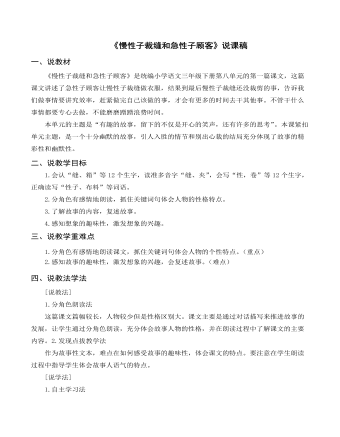
(说课稿)部编人教版三年级下册《 慢性子裁缝和急性子顾客》
一、说教材《慢性子裁缝和急性子顾客》是统编小学语文三年级下册第八单元的第一篇课文,这篇课文讲述了急性子顾客让慢性子裁缝做衣服,结果到最后慢性子裁缝还没裁剪的事,告诉我们做事情要讲究效率,赶紧做完自己该做的事,才会有更多的时间去干其他事。不管干什么事情都要专心去做,不能磨磨蹭蹭浪费时间。本单元的主题是“有趣的故事,留下的不仅是开心的笑声,还有许多的思考”。本课紧扣单元主题,是一个十分幽默的故事,引人入胜的情节和别出心裁的结局充分体现了故事的精彩性和幽默性。二、说教学目标 1.会认“缝、箱”等12个生字,读准多音字“缝、夹”,会写“性,卷”等12个生字,正确读写“性子、布料”等词语。
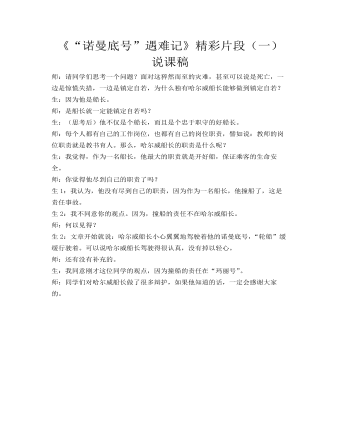
部编人教版四年级下册《 “诺曼底号”遇难记》精彩片段(一)说课稿
师:请同学们思考一个问题?面对这猝然而至的灾难,甚至可以说是死亡,一边是惊慌失措,一边是镇定自若,为什么独有哈尔威船长能够做到镇定自若?生:因为他是船长。师:是船长就一定能镇定自若吗??生:(思考后)他不仅是个船长,而且是个忠于职守的好船长。师:每个人都有自己的工作岗位,也都有自己的岗位职责,譬如说:教师的岗位职责就是教书育人。那么,哈尔威船长的职责是什么呢?生:我觉得,作为一名船长,他最大的职责就是开好船,保证乘客的生命安全。?师:你觉得他尽到自己的职责了吗?
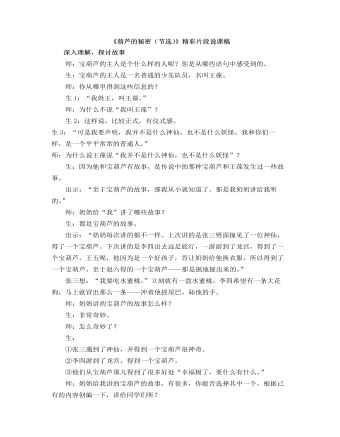
部编人教版四年级下册《 宝葫芦的秘密(节选)》精彩片段说课稿
深入理解,探讨故事师:宝葫芦的主人是个什么样的人呢?你是从哪些语句中感受到的。生:宝葫芦的主人是一名普通的少先队员,名叫王葆。师:你从哪里得到这些信息的?生1:“我姓王,叫王葆。”师:为什么不说“我叫王葆”?生2:这样说,比较正式,有仪式感。生3:“可是我要声明,我并不是什么神仙,也不是什么妖怪。我和你们一样,是一个平平常常的普通人。”师:为什么说王葆说“我并不是什么神仙,也不是什么妖怪”?生:因为他和宝葫芦有故事,是传说中的那种宝葫芦和王葆发生过一些故事。出示:“至于宝葫芦的故事,那我从小就知道了。那是我奶奶讲给我听的。”师:奶奶给“我”讲了哪些故事?
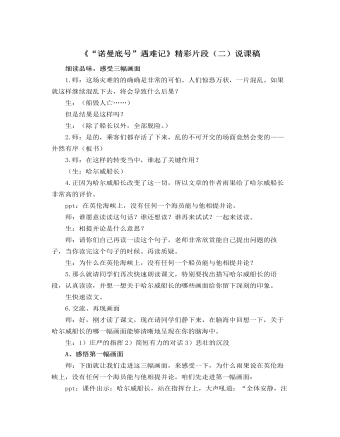
部编人教版四年级下册《 “诺曼底号”遇难记》精彩片段(二)说课稿
师:对,镇定自若。(板书:镇定自若)这份镇定自若,别人能与他相提并论吗?(不能)4.你还能从这段话中读出什么来?妇女先走,船员断后。咱们常说女士优先,在灾难面前也做到让妇女先走,这叫什么?生:绅士风度。(板书:绅士风度)5.同学们,假如你就是哈尔威船长,面对混乱的人群,你准备怎样来下达这道命令?指名学生朗读。(师指导:场面混乱,情况危急。)师:在灾难面前,时间就是生命。师:这是庄严的指挥,这是威严的指挥。我们一起来读读。师:真好,读得好,脸部的表情也非常到位,满脸的威严,正因为这样,所以课文的作者雨果是这样评价船长的,再读。ppt:在英伦海峡上,没有任何一个海员能与他相提并论。(生齐读)师:不能与他相提并论的还有他的:忠于职守、镇定自若、绅士风度。这是咱们从第一幅画面中感受到的。
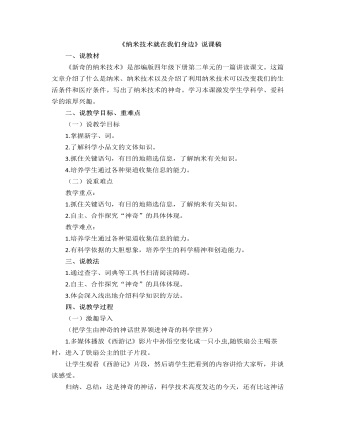
部编人教版四年级下册《 纳米技术就在我们身边》说课稿
一、说教材《新奇的纳米技术》是部编版四年级下册第二单元的一篇讲读课文。这篇文章介绍了什么是纳米、纳米技术以及介绍了利用纳米技术可以改变我们的生活条件和医疗条件。写出了纳米技术的神奇。学习本课激发学生学科学、爱科学的浓厚兴趣。二、说教学目标、重难点 (一)说教学目标1.掌握新字、词。 2.了解科学小品文的文体知识。 3.抓住关键语句,有目的地筛选信息,了解纳米有关知识。 4.培养学生通过各种渠道收集信息的能力。 (二)说重难点教学重点: 1.抓住关键语句,有目的地筛选信息,了解纳米有关知识。 2.自主、合作探究“神奇”的具体体现。 教学难点: 1.培养学生通过各种渠道收集信息的能力。 2.有科学依据的大胆想象,培养学生的科学精神和创造能力。 三、说教法 1.通过查字、词典等工具书扫清阅读障碍。2.自主、合作探究“神奇”的具体体现。 3.体会深入浅出地介绍科学知识的方法。
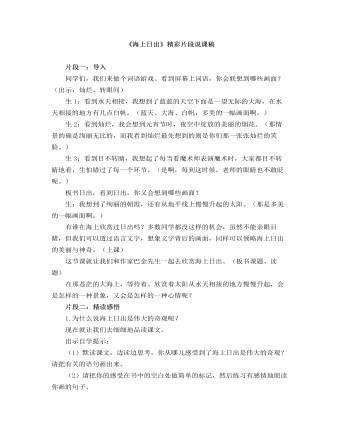
部编人教版四年级下册《海上日出》精彩片段说课稿
师:少了这两个词行不行?(不行。)为什么?生:转眼间写出了颜色变化的速度快,慢慢是指红霞扩散的速度慢。所以不能少了这两个词。师:既然颜色的变化是有快有慢,那我们在朗读的时候,速度也应该是——(有变化的 )。谁能带着你的感受来读一读。男生读。(你的朗读,让我们感受到了天空中色彩的瞬息万变。)女生读。(你甜美的朗读让我们感受到了红霞在天空慢慢晕地扩散。)齐读,透过文字,你能想象到什么样的画面?生:那浅蓝的天空和慢慢扩散的红霞让我感到这时的天空就好像是一幅美丽的水墨画。师:到底是学画画的孩子,有丰富的想象力。作者抓住了天空中颜色和光的变化,让我们感受到了海上日出是——生:伟大的奇观。(板书:颜色 光亮 变幻)看到天空中色彩的变幻以及那越来越亮的光,我知道——生:太阳要从天边升起来了,便不转眼地望着那里。透过“不转眼”你能体会到什么?(作者期待、盼望的心情。 生怕错过日出的每一个时刻。)是啊,此时,我们和作者的心情是一样的。
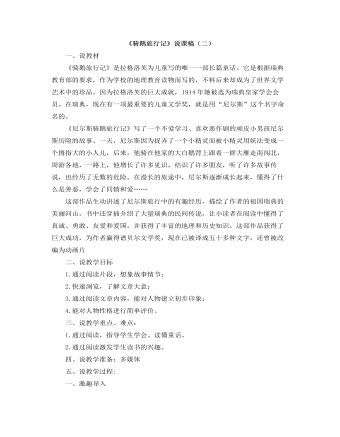
部编人教版六年级下册《骑鹅旅行记(节选)》说课稿(二)
一、说教材《骑鹅旅行记》是拉格洛芙为儿童写的唯一一部长篇童话。它是根据瑞典教育部的要求,作为学校的地理教育读物而写的,不料后来却成为了世界文学艺术中的珍品。因为拉格洛芙的巨大成就,1914年她被选为瑞典皇家学会会员。在瑞典,现在有一项最重要的儿童文学奖,就是用“尼尔斯”这个名字命名的。《尼尔斯骑鹅旅行记》写了一个不爱学习、喜欢恶作剧的顽皮小男孩尼尔斯历险的故事。一天,尼尔斯因为捉弄了一个小精灵而被小精灵用妖法变成一个拇指大的小人儿,后来,他骑在他家的大白鹅背上跟着一群大雁走南闯北,周游各地,一路上,他增长了许多见识,结识了许多朋友,听了许多故事传说,也经历了无数的危险。在漫长的旅途中,尼尔斯逐渐成长起来,懂得了什么是善恶,学会了同情和爱……
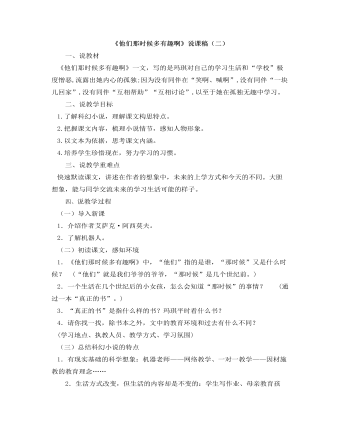
部编人教版六年级下册《他们那时候多有趣啊》说课稿(二)
一、说教材《他们那时候多有趣啊》一文,写的是玛琪对自己的学习生活和“学校”极度憎恶,流露出她内心的孤独;因为没有同伴在“笑啊、喊啊”,没有同伴“一块儿回家”,没有同伴“互相帮助”“互相讨论”,以至于她在孤独无趣中学习。 二、说教学目标1.了解科幻小说,理解课文构思特点。2.把握课文内容,梳理小说情节,感知人物形象。3.以文本为依据,思考课文内涵。4.培养学生珍惜现在,努力学习的习惯。 三、说教学重难点快速默读课文,讲述在作者的想象中,未来的上学方式和今天的不同。大胆想象,能与同学交流未来的学习生活可能的样子。 四、说教学过程(一)导入新课1.介绍作者艾萨克·阿西莫夫。2.了解机器人。(二)初读课文,感知环境1.《他们那时候多有趣啊》中,“他们”指的是谁,“那时候”又是什么时候? (“他们”就是我们爷爷的爷爷,“那时候”是几个世纪前。)
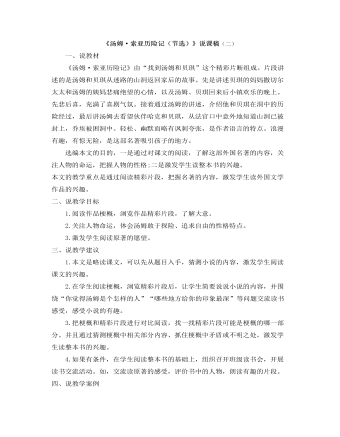
部编人教版六年级下册《汤姆·索亚历险记(节选)》说课稿(二)
一、说教材 《汤姆·索亚历险记》由“找到汤姆和贝琪”这个精彩片断组成。片段讲述的是汤姆和贝琪从迷路的山洞返回家后的故事。先是讲述贝琪的妈妈撒切尔太太和汤姆的姨妈悲痛绝望的心情,以及汤姆、贝琪回来后小镇欢乐的晚上。先悲后喜,充满了喜剧气氛。接着通过汤姆的讲述,介绍他和贝琪在洞中的历险经过,最后讲汤姆去看望伙伴哈克和贝琪,从法官口中意外地知道山洞已被封上,乔埃被困洞中。轻松、幽默而略有讽刺夸张,是作者语言的特点。浪漫有趣,有惊无险,是这部名著吸引孩子的地方。 选编本文的目的,一是通过对课文的阅读,了解这部外国名著的内容,关注人物的命运,把握人物的性格;二是激发学生读整本书的兴趣。 本文的教学重点是通过阅读精彩片段,把握名著的内容,激发学生读外国文学作品的兴趣。
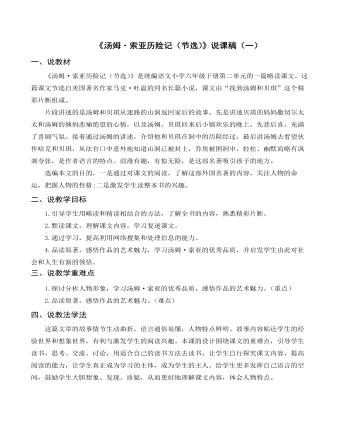
部编人教版六年级下册《汤姆·索亚历险记(节选)》说课稿(一)
一、说教材《汤姆·索亚历险记(节选)》是统编语文小学六年级下册第二单元的一篇略读课文。这篇课文节选自美国著名作家马克·吐温的同名长篇小说,课文由“找到汤姆和贝琪”这个精彩片断组成。 片段讲述的是汤姆和贝琪从迷路的山洞返回家后的故事。先是讲述贝琪的妈妈撒切尔太太和汤姆的姨妈悲痛绝望的心情,以及汤姆、贝琪回来后小镇欢乐的晚上。先悲后喜,充满了喜剧气氛。接着通过汤姆的讲述,介绍他和贝琪在洞中的历险经过,最后讲汤姆去看望伙伴哈克和贝琪,从法官口中意外地知道山洞已被封上,乔埃被困洞中。轻松、幽默而略有讽刺夸张,是作者语言的特点。浪漫有趣,有惊无险,是这部名著吸引孩子的地方。 选编本文的目的,一是通过对课文的阅读,了解这部外国名著的内容,关注人物的命运,把握人物的性格;二是激发学生读整本书的兴趣。
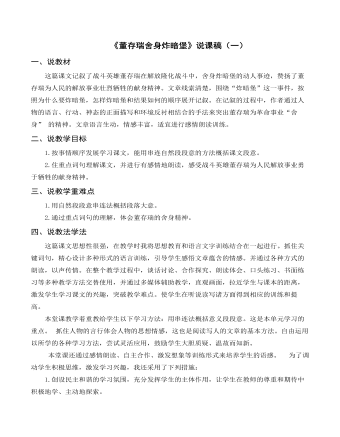
部编人教版六年级下册《董存瑞舍身炸暗堡》说课稿(一)
四、说教法学法这篇课文思想性很强,在教学时我将思想教育和语言文字训练结合在一起进行。抓住关键词句,精心设计多种形式的语言训练,引导学生感悟文章蕴含的情感。并通过各种方式的 朗读,以声传情。在整个教学过程中,谈话讨论、合作探究、朗读体会、口头练习、书面练 习等多种教学方法交替使用,并通过多媒体辅助教学,直观画面,拉近学生与课本的距离,激发学生学习课文的兴趣,突破教学难点。使学生在听说读写诸方面得到相应的训练和提高。 本堂课教学着重教给学生以下学习方法:用串连法概括意义段段意。这是本单元学习的重点。 抓住人物的言行体会人物的思想情感,这也是阅读写人的文章的基本方法。自由运用以所学的各种学习方法,尝试灵活应用,鼓励学生大胆质疑、温故而知新。本堂课还通过感情朗读、自主合作、激发想象等训练形式来培养学生的语感。 为了调动学生积极思维,激发学习兴趣,我还采用了下列措施:
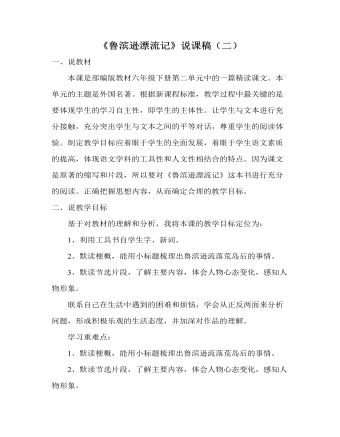
部编人教版六年级下册《鲁滨逊漂流记(节选)》说课稿(二)
四、说学法学生是学习的主体。皮亚杰认为,在教学过程中,儿童如果不具有自己的意象活动教育就不能成功。1、整体感知,初步了解课文的大概内容。学生先自读课文。自学完以后,概括出文章的主要内容。这样,学生就会从整体上知道这篇课文讲的是什么内容。2、充分自学。人的大脑接受信息,有意注意总比无意注意有效得多。本课内容浅显易懂,可以充分放手让学生自学,经过自学,学生对课文有了一个大概了解,有了一番摸索的功夫,或者是略有解悟,或者是不得要领,或者是困惑不解。一旦进入探讨阶段就会全身心投入。一方面可以从容、有条不紊地发表自己的见解;另一方面略有所悟的急需得以印证和深化,不得要领的急需理清头绪,困惑不解的急需弄个明白,自然都格外注意,毫不懈怠。这样既提高了学习兴趣,又留下了深刻印象,还强化了自主意识。
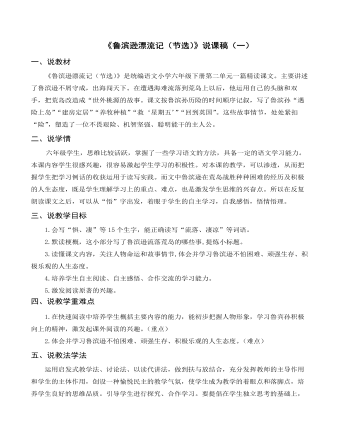
部编人教版六年级下册《鲁滨逊漂流记(节选)》说课稿(一)
一、说教材《鲁滨逊漂流记(节选)》是统编语文小学六年级下册第二单元一篇精读课文。主要讲述了鲁滨逊不屑守成,出海闯天下。在遭遇海难流落到荒岛上以后,他运用自己的头脑和双手,把荒岛改造成“世外桃源的故事。课文按鲁滨孙历险的时间顺序记叙,写了鲁滨孙“遇险上岛”“建房定居”“养牧种植”“救‘星期五’”“回到英国”。这些故事情节,处处紧扣“险”,塑造了一位不畏艰险、机智坚强、聪明能干的主人公。二、说学情六年级学生,思维比较活跃,掌握了一些学习语文的方法,具备一定的语文学习能力。本课内容学生很感兴趣,很容易激起学生学习的积极性。对本课的教学,可以渗透,从而把握学生把学习例话的收获运用于读写实践。而文中鲁滨逊在荒岛战胜种种困难的经历及积极的人生态度,既是学生理解学习上的重点、难点,也是激发学生思维的兴奋点。所以在反复朗读课文之后,可以从“悟”字出发,着眼于学生的自主学习,自我感悟,悟情悟理。
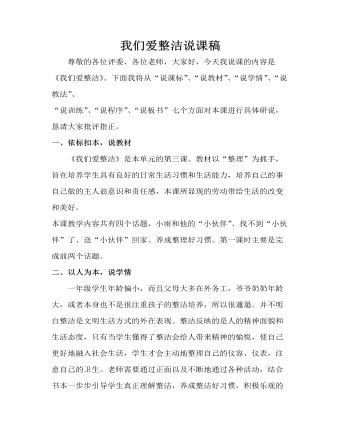
人教部编版道德与法制一年级下册我们爱整洁说课稿
1.学生思考:从故事中能不能找到自己?2.学生发挥的想象,思考绘本故事中不同情境中皮皮的相同经历,进行故事创编。反馈指导:1.说一说从故事中你找到的自己。2.(出示ppt)交流同学们创编的故事。3.思考讨论:为什么皮皮到哪儿都不受欢迎呢?小结:交流分享后,老师设疑:皮皮难受极了,他该怎么办呢?活动四:找原因,见行动导语:这只不爱干净、仪表不整洁的小猪皮皮给我们打来了求助热线,让我们一起来帮帮不受欢迎的皮皮吧。出示任务:出示ppt,师生共读、交流绘本《皮皮的故事》第6、7、8幅图的内容。课后每个小朋友都做一次家庭小调查,发现自己在洗漱习惯方面哪些做得好,还存在哪些问题呢?反馈指导:1.讨论:你从故事中懂得了什么?2.(出示ppt)说说你准备怎样做一个整洁干净的好孩子?课后完成《家庭小调查表》。
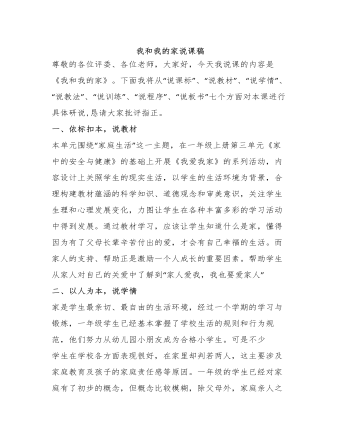
人教部编版道德与法制一年级下册我和我的家说课稿
动画二:按格式调查爸爸、妈妈、爷爷、奶奶的生日动画三:爸爸的生日:年月日动画四:妈妈的生日:年月日动画五:爷爷的生日:年月日动画六:奶奶的生日:年月日1、教师引导学生回家从侧面了解家人的生日,并记录下来。2.师:接下来,我们就为我们即将要过生日的,或是已经过完生日但是被我们遗忘的家人设计一份礼物,送给他们表达我们的祝福与心意。要求.学生制作贺卡等礼物。3.师:想一想,除了记住家人的生日,我们还可以用哪些方式来表达自己对家人的爱呢?学生讨论交流。4.小结:今天,我们深深地感受到家人深厚的爱。家人对自己的细腻关怀是爱,家人的严格要求也是爱。家人的爱像大海一样深,像草原一样广。我们也应该为家人做些什么,来表达我们对家人的爱。这样,一家人才能相亲相爱地生活在一起。
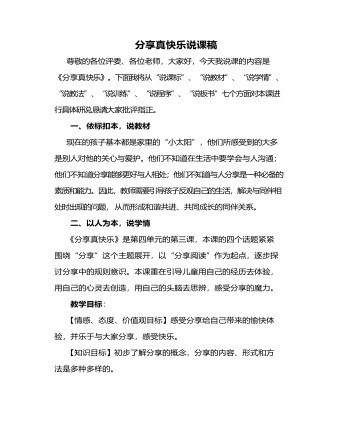
人教部编版道德与法制一年级下册分享真快乐说课稿
(设计意图:在快乐轻松的活动中让学生真正感受分享的快乐。) 活动四:辨析分享1、是啊,分享本是一件很快乐的事,可是,小萌却一点儿也不快 乐,我们一起来看看发生了什么事?你是怎样看待这种问题呢? 播放视频故事,学生交流看法。2、儿歌展示分享小秘诀,学会分享。3、学生交流学习心得。4、小结:分享在我们的生活中无处不在。你乐于与他人分享,别 人才会愿意和你分享。如果有人愿意与我们分享物品或其他的事情时,我们要懂得珍惜,当别人不愿意和我们分享一些东西时, 要学会理解别人,可能那东西对他来说特别珍贵,不适合与我们分享,这时,我们也不要强求。5、欣赏儿歌,巩固体验:分享真快乐。6、布置作业:把自己的开心事分享给爸爸、妈妈。
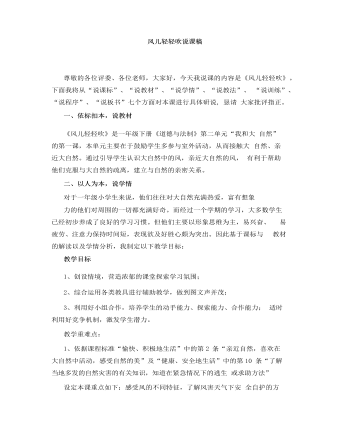
人教部编版道德与法制一年级下册风儿轻轻吹说课稿
6.小结:在我们身边,到处都充满了空气,刚才同学们用嘴吹, 用书本扇,用力跑,老师用手挤塑料袋里的空气,空气也跟着我 们做起了运动,这样就形成了风,风形成于空气的流动。【设计意图:进一步体会空气的流动会产生风,培养学生的动脑 和动手能力。】活动三 和风一起玩 师:风吹走了严寒,吹来了春天。我们可以和风一起玩了,想和 风一起玩什么呢?指名回答。(课件出示 ) 师:有那么多好玩的游戏, 可以和风一起玩。 想不想现在就去呢? 师生一起到操场尽情地玩风车、纸飞机、吹泡泡 师:同学们,刚才在外面和风一起玩,有什么感受?指名回答。老师和你们一样,和风一起玩的时候,感觉特别高兴,特别快乐,特别有趣。(板书:玩——真有趣) 师小结:同学们这就是我们今天这节课所了解到,感受到的,找风到处有,和风玩真有趣。还想对风有新的认识吗?下节课我们继续学习。【设计意图:感受和风一起游戏的快乐。】
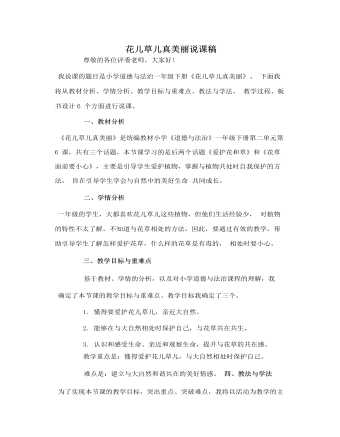
人教部编版道德与法制一年级下册花儿草儿真美丽说课稿
活动二:花草面前要小心 学生谈一谈自己曾经遇到过的或听说过的因与植物接触而受伤的事情,教师引导学生学会与植物共处时自我保护的方法。(板书: 保护自我)设计意图: 掌握与植物共处时自我保护的方法,学会与自然中的 美好生命共同生长。活动三:与花儿草儿共在课件出示儿歌《玫瑰花》。学生先自己读一读,再全班一起读。设计意图:再次感受美丽而神秘的植物世界。 环节三:课堂小结,内化提升 学生谈一谈学习本节课的收获,教师相机引导。设计意图:梳理总结,体验收获与成功的喜悦,内化提升学生的 认识与情感。环节四:回归生活,拓展延伸 回家后,学着种些花和草。设计意图: 将课堂所学延伸到学生的日常生活中,有利于落实行 为实践。六、板书设计为了突出重点, 让学生整体上感知本节课的主要内容, 我将以思 维导图的形式设计板书:

